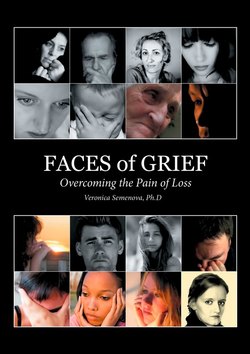Читать книгу Faces of Grief. Overcoming the Pain of Loss - Veronica Semenova - Страница 8
Chapter two. Myths and Truths About Grief
How to Help Yourself in Grief
Оглавление«Only people who are capable of loving strongly can also suffer great sorrow, but this same necessity of loving serves to counteract their grief and heals them.»
Leo Tolstoy (1828—1910)
One of the strongest reasons for writing this book was to provide enough information to put the myths about grief to rest and assure grievers that everything they feel is normal, and that they have a right to behave as they feel. Holding on to myths can hinder the healing process and lead to depression and frustration. It is very important to have realistic expectations of what you may and will experience in grief.
These true expectations are:
Grieving is a natural process
It leads slowly from the pain of loss to a new life without the deceased. You don’t get over it: you learn to live with it.
Your grief will change with time
It does not always decrease intensity. The grief process is much more like a roller coaster, with ups and downs happening at times when you least expect them.
You are the expert about your own grief
No one can understand your grief better than you do.
When you grieve, you grieve not only the person you have lost
You also grieve all the hopes and dreams you held for a future with the person who died.
You have the right to your own feelings
No feelings are right or wrong: they just are, and you and other people around you need to respect that. Give yourself permission to feel and express all the emotions you are experiencing.
Crying is one of the ways of coping with grief
Tears help us release the pain and pressure from within. Crying doesn’t mean that you are weak or cannot control yourself. Tears mean that you have loved. Crying helps you heal. So go ahead and cry.
You will experience physical problems as you grieve
Our immune system is strongly influenced by our emotions. In times of acute stress, our bodies’ defenses are focused on restoring emotional and physical balance, and the immune system’s ability to fight bacteria, viruses, and cancer cells is impaired. Loss of appetite or overeating, lack of sleep or lethargy, and lack of physical activity are just a few critical symptoms of grief. Therefore, when in grief, it is very important to take care of yourself. Fresh air, walks, rest, physical activity, and good food are essential to keep the body functioning and the immune system strong. Try to stay away from drugs, alcohol, or tranquilizing medications as these can delay your healing. Be good to yourself.
Grief brings despair
You may feel you have nothing to live for. Sometimes you might wish your life would end, to stop the pain. Please remember that you are not alone. Many people feel and think this way, but over time their pain lessened and they found a sense of meaning and went on living. Time may not heal all wounds, but it helps.
You may blame yourself for your mistakes
Some mistakes may be real, while others are imaginary. Talk about your thoughts with others: it helps. Find a therapist who works with grief if you feel that self-blame and guilt are hindering your healing. It is possible to find forgiveness and restructure even the heaviest guilt.
It is normal to feel angry when grieving
You may feel angry at the person who died (or left you alone), at other family members, at doctors or anyone who didn’t save your loved one or did not do enough to help, at other families who have not lost their loved ones – even at God and the whole Universe. Releasing your anger and working with it helps you heal. Suppressing anger leads to depression and harms you physically.
The death of a loved one can challenge your beliefs
These beliefs may be in God, in your religion, or in the justice of the Universe. There is nothing wrong with it. Many people find answers in their religion during times of grief: they find a deeper meaning of life, their faith, and overall philosophy.
The loss of your loved one may trigger grief for earlier losses that you had not resolved at the time when they occurred
Unresolved losses, guilt, and self-blame will need to be resolved as part of confronting your current loss. Think of this as a chance to heal your old wounds; to become free from carrying heavy old luggage.
Grief will evoke your own mortality issues and force you to re-evaluate your identity
Give yourself time to process these important aspects. Seek help, if necessary.
Give yourself permission to grieve
Feelings are neither right nor wrong, they need to be respected, expressed, and acknowledged.
